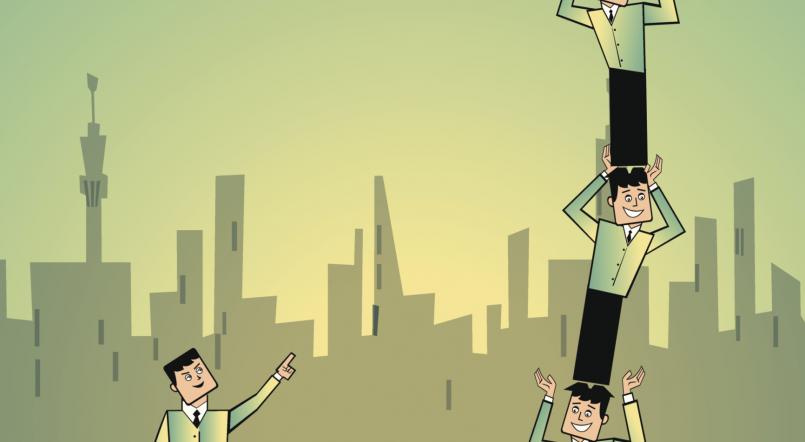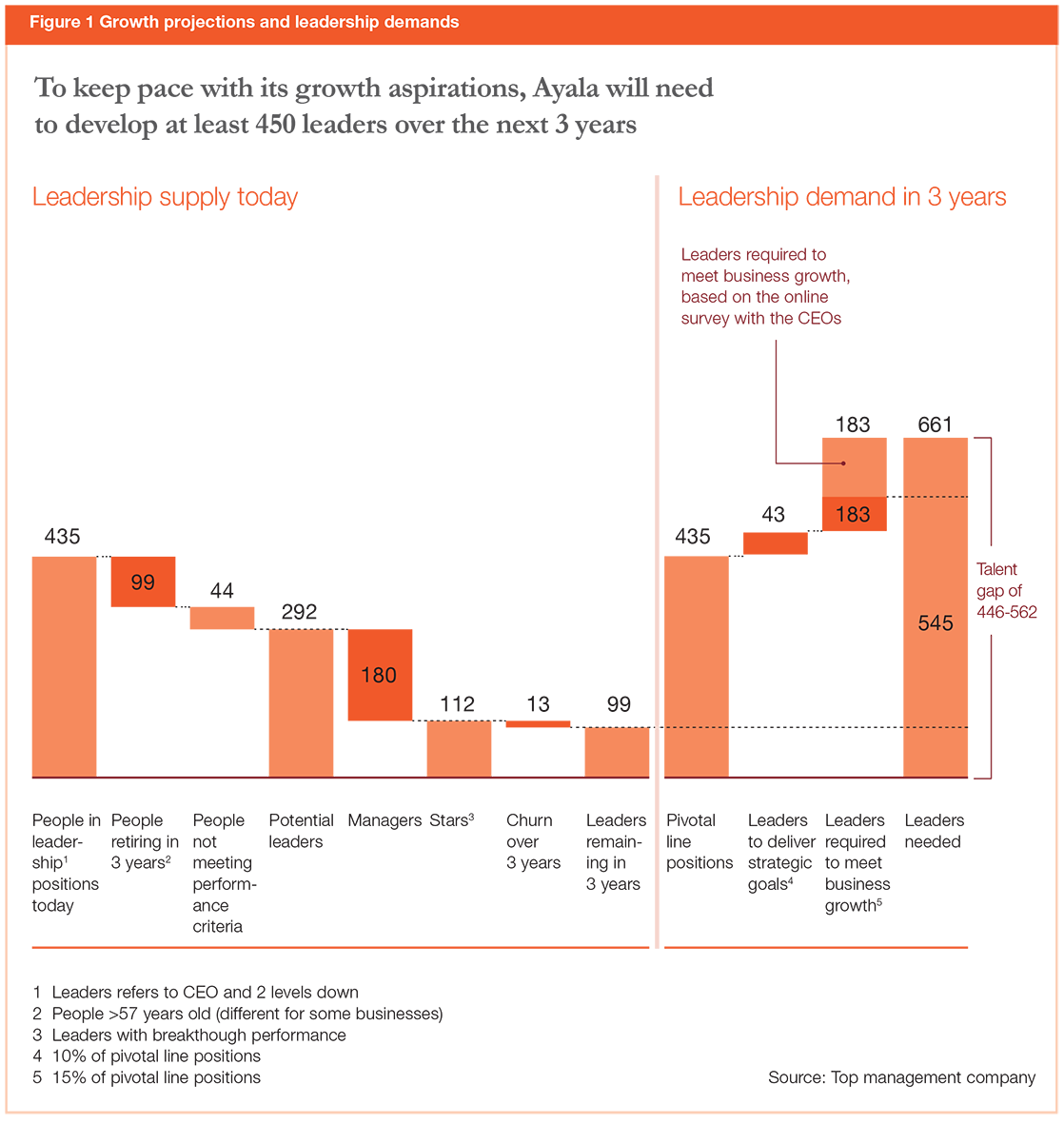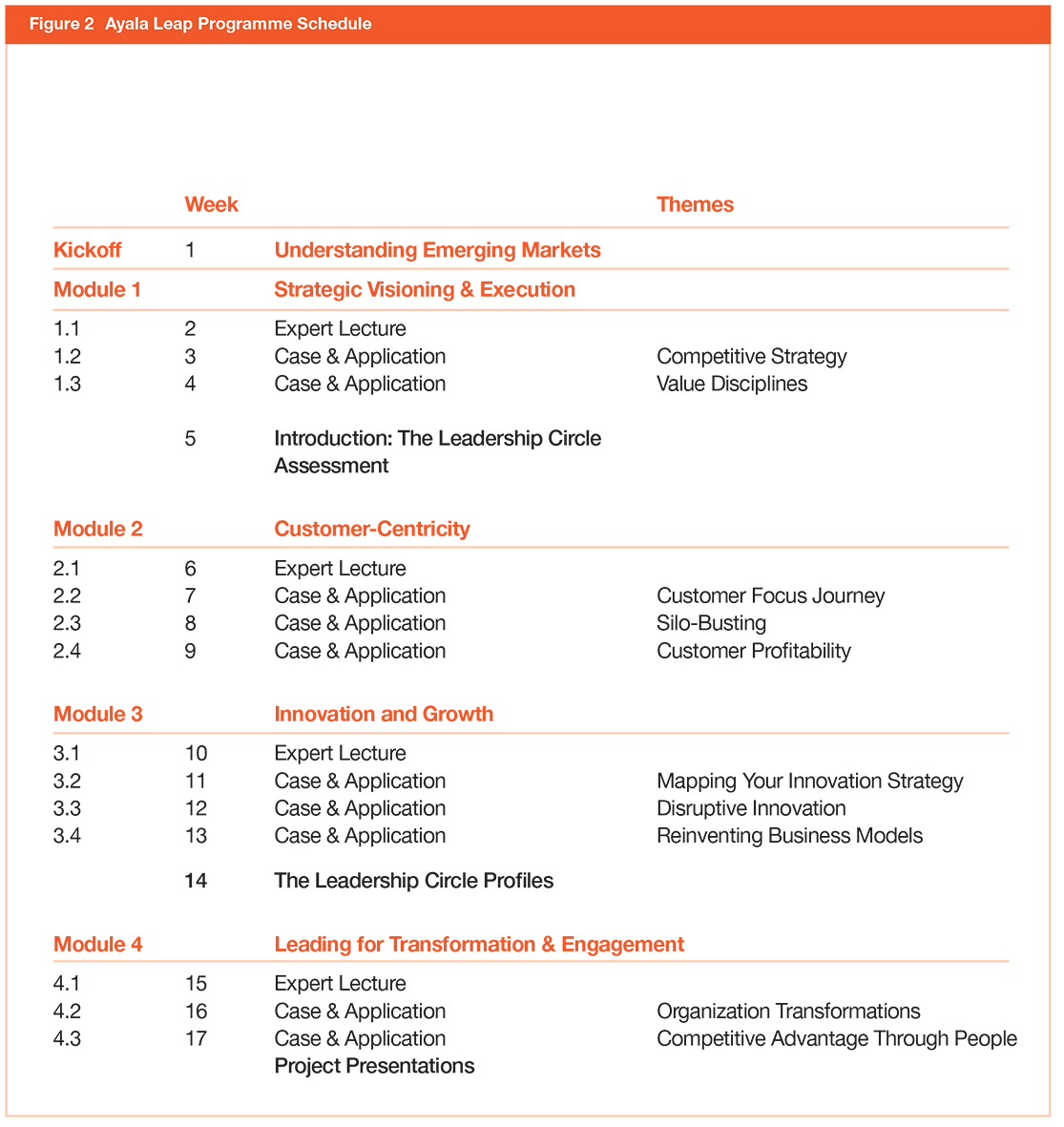Ayala is one of the most widely diversified conglomerates in the Philippines, with interests in real estate, banking and financial services, telecommunications, electronics and information technology, water infrastructure, other domestic and international operations, and recently, energy.
Leadership Gap
To maintain growth across several sectors, Ayala’s senior management had to identify leaders and talents needed to drive new growth engines for the company. Research on the leadership profile across the conglomerate was conducted, showing that 23% of the senior leadership team would retire within the next three years, and that number increases to 45% over five years (see Figure 1). Factoring in our growth aspirations, we needed around 450 to 550 senior leaders in the next three years.
Figure 1: Growth projections and leadership demands (Click on image to enlarge.)
Readiness to take on senior posts was another issue. While there was a fairly deep management bench, CEOs recognised the inadequacy of the next line of managers to assume enterprise management roles.
Company Profile —Ayala Corporation
Ayala Corporation is one of the oldest and largest business groups in the Philippines. In 2010, it generated revenues more than US$2.3 billion equivalent to 3% of the country’s GDP.
The group and its listed holdings have a combined market capitalisation of US$13 billion and employ over 50,000 people worldwide.
Laying the Groundwork
Recognising that talent is a key driver of business growth, the company focused on developing talent and leveraging the diversity of skills within the conglomerate structure by creating a talent pool of future leaders.
The need to build an over-arching leadership development programme that complements and enhances existing programmes within our business units was identified. Till then, training programmes focused on business, and were process – or transaction-oriented. They were geared towards core technical competencies within specific lines of work, but did not cover broader managerial disciplines. Thus, priority was given to create programmes aimed at developing senior leaders with strong group orientation and peer networks.
To start, we conducted formal talent reviews on 500 of our most senior business and functional executives across the group. This review called for a thorough assessment by the CEOs and their management teams, with the information processed in a common framework to be used by the group. This information includes:
- Individual Profiles: employment, assignments, performance and promotions history, competency assessments, career aspirations and performance feedback
- Performance evaluation summaries on achievements, deliverables and KRAs, and competency profiles, values and behaviours
- Performance-potential summaries, including the identification of high potentials or star performers below senior management
- Career and succession plans, including possible stretch assignments and developmental assignments
Jaime Augusto Zobel de Ayala, Ayala chairman and CEO, reveals: “For each business unit, we invited the CEO, the HR head and a senior executive to spend time going over each talent. We singled out star performers to ensure that there is a purposeful career plan for them. We summarised and agreed on developmental plans, as these plans would involve movements of senior executives across the group. We have been very deliberate about this process in recent years, and have moved a number of senior executives to better assignments to address the succession plan.” This process helped extensively in identifying participants in our senior leadership development programme.
The Ayala Leadership Excellence Acceleration Programme (LEAP)
The group had leadership development programmes (classroom-based programmes, experiential programmes, e-learning platforms, etc). However, we felt we needed something more holistic and defined our goals to help select the right partner and platform for our training programme:
- Develop higher-order leadership skills to enable 200 of our most promising senior managers to transition to greater levels of responsibility;
- Engage participants in a network of peer-mentors and foster stronger bonds and collaboration capabilities among managers in the Ayala group;
- Provide opportunities to practise new approaches on the job applications and team projects; and
- Inculcate a learning approach to support continuous lifetime learning and development
In 2009, we decided to work with Harvard Business Publishing (HBP) group for their Leadership Direct platform. We identified four key areas for the programme: strategic visioning and execution, innovation and growth, customer-centricity, and transformational leadership. An 18-week programme was put together around these modules, with case studies chosen for applicability and desired learning outcomes (see Figure 2).
Figure 2: Ayala Leap programme schedule (Click on image to enlarge.)
During the programme, we introduced the 360° feedback process, The Leadership Circle Profile™, to help our executives understand how others see them. The programme provided an opportunity for self-insight and reflection. 16 of our senior HR leaders underwent a three-day certification programme to guide the participants in understanding their profiles and establishing action plans for behavioural change.
Participants attend a four-hour, half-day session per week for 18 weeks, and spend eight to 12 hours for self-study, case readings and group discussions. A typical 90-minute class includes a lecture by a Harvard professor, a case discussion led by a moderator, followed by small group discussions. During case studies, participants are encouraged to challenge the status quo and think out of the box, whereby interesting ideas emerge – a new strategy, a business opportunity, an unusual application of products, or a combination of these.
LEAP takes this even further. The main issue we have had with previous programmes is that they are all heavily dependent on a classroom setting and remain largely an intellectual exercise. What we liked about the Harvard programme is the blend between expert lectures and participant-led learning, through carefully selected cases discussed each week.
After each case or lecture, participants have to use what they have learnt and apply it to their work situation, be it customer behaviour, innovative approaches, changing a risk-averse culture or personal leadership issues. Furthermore, the cohort is broken into groups to tackle an actual burning issue facing a company within the conglomerate.
These groups are given three months from the end of the LEAP programme to work on a game-changing project that will be presented to their CEO and Management Committee, and eventually to the Group CEO and COO. In fact, many past projects have already been implemented, and some have made significant contributions. Working closely over the time frame not only builds bonds across the group, but also increases participants’ confidence to try new ideas in their workplace.
There's a tremendous diversity of talents across the group. A large part of the job is to create the right environment where people can perform and deliver.
Post-LEAP
Participants are required to propose a project they can work on during the three months. Assignments are vetted by their peers and suggestions are made to sharpen their scope. Project groups are formed for support, and outcomes are to be presented to their CEOs and management committees as well as to the Ayala group CEO and COO.
One project worth highlighting is the cross-selling of products to distinct consumer bases through customer loyalty and rewards programmes for premier customers in banking, telecommunications and real estate. Launched in Cebu, the group introduced APEX (Ayala Privileged Exclusives) to around 300 premium customers. The launch event generated close to US$2.7 million in new business. Its success has prompted Ayala to replicate the programme on a national level.
The project approval process in Ayala Land has improved from 180 to 90 days, without any compromise in financial, legal and design due diligence. Our EMS manufacturing unit, IMI, has moved from a geographic organisation to a customer/sector based structure aligned with its manufacturing facilities around the world. Meanwhile, Ayala’s banking affiliate, Bank of the Philippine Islands, has rebranded and repositioned itself for greater customer focus – all achieved through the combined efforts of LEAP project teams.
In addition, interactions among LEAP participants have brought out different perspectives in culture and network building. Working with peers from other parts of the group has created a stronger network, and led to more effective cross-business and functional interaction. Our executives have become more conscious of synergy, and want more shared business opportunities for existing and prospective customers. They have become more supportive of new initiatives.
Additionally, we are now seeing more customer facing teams working together to offer products and services. “There’s a tremendous diversity of talents across the group. A large part of the job is to create the right environment where people can perform and deliver. They can all do what they’re good at but come together to create something better. We strongly believe that the whole is bigger than the sum of its parts,” adds Zobel.
A new breed of leaders in the company is emerging. We have already seen several LEAP alumni promoted this year to full general management roles, sooner than originally planned. As we conduct this year’s annual talent review, many of our LEAP graduates will be given new and bigger leadership roles. We are confident that they can move up and carry on the new mandate for a more progressive Ayala.
This article was first published in HQ Asia (Print) Issue 02 (2011)




